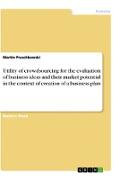- Start
- Utility of crowdsourcing for the evaluation of business ideas and their market potential in the context of creation of a business plan
Utility of crowdsourcing for the evaluation of business ideas and their market potential in the context of creation of a business plan
Angebote / Angebote:
Master's Thesis from the year 2016 in the subject Business economics - Miscellaneous, University of applied sciences, Nürnberg, language: English, abstract: If candidates in the TV show "Who wants to be a Millionaire?" no longer know what to do, they often seek help at the phone joker. In the supposed experts, most players see the best advisers. But only in 54 percent of cases the responses of the phone joker is correct. This is still more than a 50:50 joker. However the much better choice is the audience joker. This joker has an average success rate of about 90 percent regardless of the time of its use. Therefore it is the best joker of all by using the collective distributed knowledge of people. That demonstrates that the participation of the crowd usually leads to a better result because the average of many independent judgments is often very close to the truth. Several years ago the sociologist James Surowiecki described this phenomenon in his international bestseller "The Wisdom of the Crowds" and demonstrated with many examples that a group can find better solutions and make more intelligent decisions than individuals. He justified this on one hand with the fact that individuals are often guided by feelings, on the other hand that they have limited information and consequently only a limited view. Because of self-organizing, statistical effects (e.g. law of large numbers) and the fact that the crowd is not limited to bureaucracy, administration, time or location the crowd can surpass every individual expert. Crowdsourcing, the next step in the evolution of outsourcing can activate the wisdom of the crowd by using the collective intelligence of a large number of individuals from cognitively diverse perspectives. For instance the web-based encyclopedia Wikipedia, the web browser Firefox or the operating system Linux rely on the participation and collective knowledge of the crowd. On Wikipedia any internet user can write, use, edit and distribute articles free of charge and in accordance with some principles. After the publication, the article will be corrected, expanded and updated by the collective. The creation of open source software works in a similar way. The program is accessible to everyone and so the source code can be continuously processed by globally spreaded software developers. The idea is to use knowledge and skills from many people and make it accessible to all.
Folgt in ca. 10 Arbeitstagen


